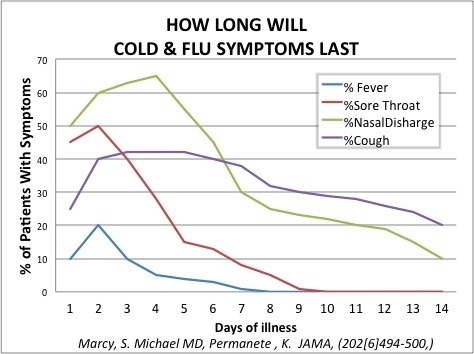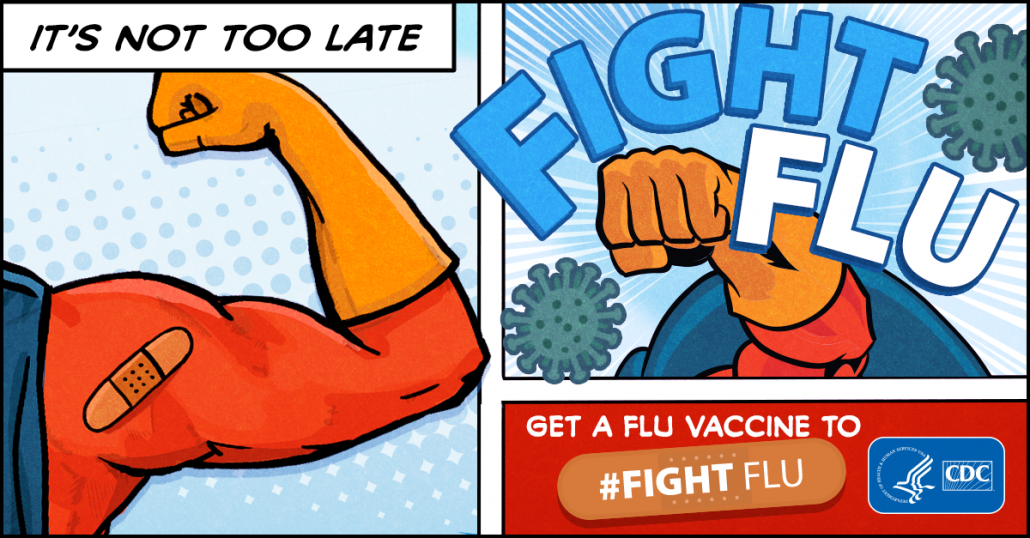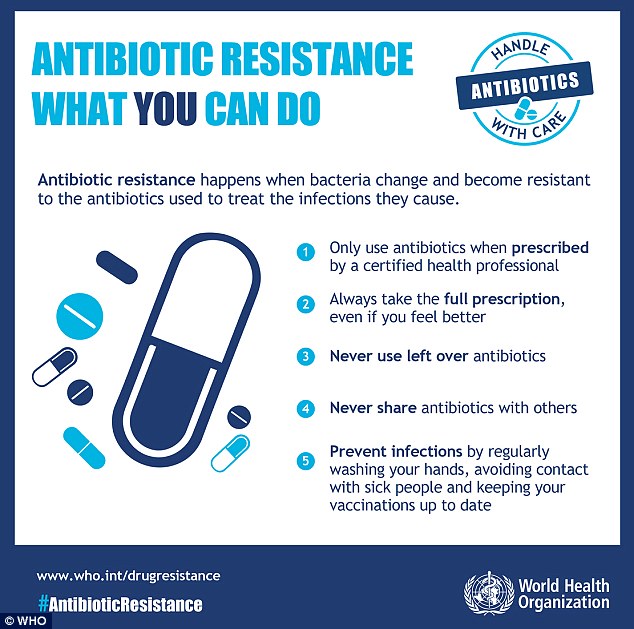10 Common myths about Colds and Flu
- MYTH #1. The flu vaccine causes the flu
Why it’s not true: The viruses contained in flu shots have been INACTIVATED which means they really can’t cause infection. Your body may mount a response to the inactivated virus and you may have flu-like symptoms, but not an actual flu infection. It is also possible that you may catch another virus entirely different from influenza around the same time as when you get the flu vaccine.
MYTH #2. You can catch a cold from getting cold
Why it’s not true: ONLY a cold virus causes a cold. Being in cold weather will only make you colder (nose and eyes run a little more), not sicker. Bundle up for comfort and to avoid hypothermia.

Myth #3: If you don’t have a fever, you’re not contagious
Why it’s not true: If you have a cold, you are most contagious for the first 2 to 3 days, whether you have a fever or not. The contagious phase of most cold viruses is usually over by day 7 to 10.
*Adults and older children with colds generally have a low fever or no fever at all. Young children, though, often run a fever around 100° to 102°F.

Myth #4: Taking Vitamin C will help you get over a cold or the flu
Why it’s not true: Studies have not demonstrated that taking Vitamin C supplements improves cold/flu symptoms or treats the flu or cold viruses. Check out this Pubmed article on Vitamin C and the common cold, click here.
**If you develop sinusitis, rhinitis (runny nose) after consuming dairy, you may have an allergy to dairy and you should see an allergy expert for that.

Myth #5: Your cold could turn into the flu
Why it’s not true: The flu and the common cold are caused by different viruses. So a cold can’t actually “morph” into the flu. People with colds are more likely to have a runny or stuffy nose. The Flu is worse than a cold–there are more intense symptoms such as fever, body aches, extreme tiredness, and a dry cough.
Myth #6: The flu just isn’t that serious
Why it’s not always true: Most are mild cases and won’t need medical care or antiviral drugs–recovery is usually in less than two weeks.
*Make no mistake: The CDC warns that complications from the flu can be DEADLY. An average of 36,000 people die each year from the flu and more than 200,000 are hospitalized.
*Flu complications: Pneumonia, Bronchitis, Sinus and Ear infections, Asthma attacks.

Highest risk: Children under 5, adults over 65, pregnant women, and those with chronic illnesses—especially Asthma.
Myth #7: Staying away from sick people is the only way to avoid a cold/the flu
Why it’s not always true: People can be contagious without showing any symptoms (see Myth #3).
You also need: Good hand hygiene and proper sneeze etiquette; also, consider the flu shot especially if you have a history of asthma or other lung disease.


Myth #8: If you get the flu, you’ll be immune after that
Why it’s not true: Although you immediately become immune to the one particular flu virus you contracted, after that flu runs its course you could still contract a different flu virus, the common cold virus (called Rhinovirus), or another virus that causes upper respiratory tract infections or lung infections (Sorry 😐).
Peak Flu season is: Flu season can start as early as October; it peaks between December and February and can last till as late as May (according to the CDC).
Myth #9: Getting vaccinated every year isn’t necessary
Why it’s not true: Flu viruses do change from year to year, which means two things: 1. You can get the flu more than once during your lifetime. 2. A vaccine against flu viruses circulating last year may not protect against the newer viruses (to be honest, a vaccine against the flu viruses circulating this year may not protect against ALL the current influenza viruses in this year).
**I am not trying to sell the flu vaccine, however, if you have Asthma, Chronic Bronchits, COPD (Chronic Obstructive Pulmonary Disease), or Chronic Lung Disease (as a result of prematurity), the Flu Vaccine is strongly recommended because the risk of severe complications from flu in such patients is much higher than the risk of complications from the flu vaccine.

Myth #10: Antibiotics can treat Flu or cold viruses
Why it’s not true: Antibiotics DO NOT fight infections caused by viruses like colds, flu, most sore throats, and bronchitis. In fact, many sinus and ear infections can get better without antibiotics. Symptom relief, instead, might be the best treatment option for these infections. Also, it is important to note that the medicine for Flu will not treat a common cold or other cold viruses.

For greater details about misconceptions about the flu and flu vaccine, please check out this fantastic CDC article by clicking here.
Wishing you great health and warm happy times through this winter season.

Love,
Chichi







Great insights as always!
Thanks a bunch Boo for your time and knowledge-share to humanity in various ways!
God’s continuous blessings hon😚😎
Awww…thank you so much. God bless you too 😊
Thank you Chinyere!!! Helpful information!!!
Thank you so much for stopping by…I am glad you found this to be helpful 😊
Chichi, this is very informative and easy to understand. How do you feel over the counter drugs to cure a cold or a flu?
Over the counter drugs do not cure the cold or flu–they just help relieve symptoms. This is not to trivialize them, it is just for you to know what you are getting. The human body’s immune system is designed to viruses like the common cold and flu viruses, so as long as your immune system is intact, you should be able to handle viruses. A lot of the symptoms you feel from these viruses are as a result of your body mounting a response to the viruses. So go ahead and purchase decongestants, fever reducers, and pain relievers–they will help you with symptom relief as your body does the real work of destroying the virus.
Good evening. Many thanks 🙂 Great article.
Thank you so much for checking out this article. I hope you found it helpful. Please feel free to share it with others. Cheers, Chichi